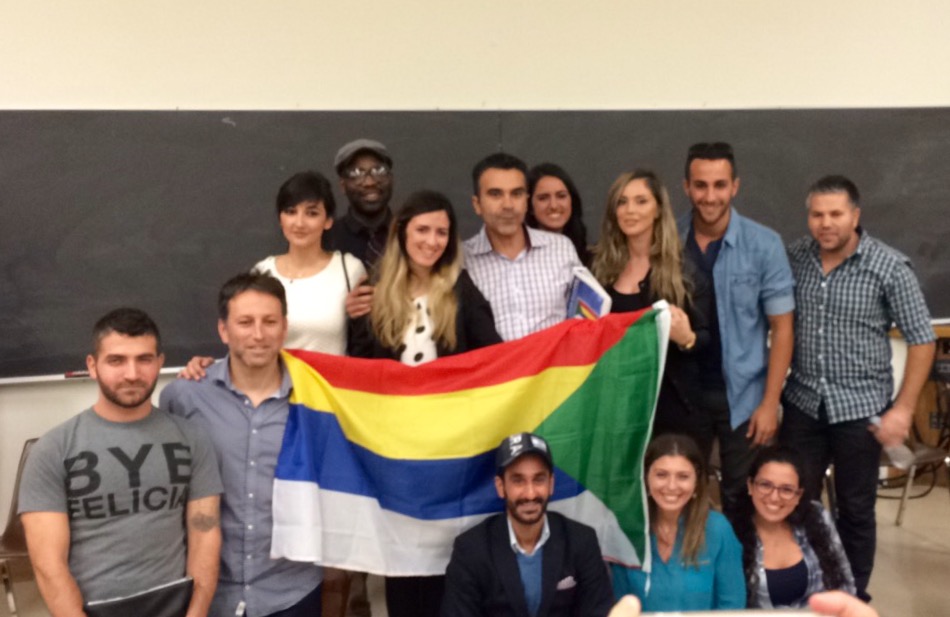This past Monday, October 26, UCLA welcomed seven Druze Israelis to speak at the law school as part of their two-week long tour in the United States. The event was hosted by several Jewish and Jewish-affiliated organizations, including Bruins for Israel, Students Supporting Israel, Chabad, Nessah Synagogue, StandWithUs, and Zionist Organization of America.
Simon Etehad, the president of Nessah Synagogue, served as moderator, leading the Q&A discussion between the guest speakers and audience of about 100 students in the large lecture hall. To begin the conversation, the panelists first gave some background information about the Druze faith.
As Lieutenant Shuki Hasson explained, the Druze are a monotheistic people who have an ancient history, and their religion dates back about 1,000 years with an Egyptian origin. Often called “the secret religion,” the Druze faith is very exclusive — only those born to both a Druze father and mother are considered Druze, and one may not convert or marry into the religion. Additionally, only those Druze who choose to be very religious may study its teachings past the age of 15.
While the Druze are Arabic-speaking and may or may not identify as ethnic Arabs, their religion touches on Judaism, Christianity and Islam. The faith stresses an importance of modesty and abstinence; Druze people are forbidden from drinking, smoking, wearing jewelry and eating certain foods. Like many, but not all, Jews, the Druze believe in the reincarnation of souls. They even have their own flag made up of five symbolic colors: green for the mind, yellow for logic, red for emotions, blue for modesty and white for purity.
According to First Sergeant Dr. Amir Halabi, the Druze relate to the Jewish people because of their history of persecution. The Druze suffered oppression in their countries of origin, such as Lebanon, Syria and Jordan, before escaping to Israel and situating themselves on tops of mountains for protection.
A 1956 pact between the Druze and the government of Israel, in response to Druze request, made it mandatory for Druze to serve in the Israeli army. As Halabi explained, the Druze have long been one of Israel’s most loyal minority groups, and in return, Israel has treated them as her own. However, while the Druze have felt equal to Israeli Jews in the army, in civilian life, “not everything is rosy,” Halabi said.
Because of their fairly secluded lifestyle, the Druze require a sufficient amount of living space, but Israel has yet to grant them their desired portion of land and infrastructure. Regardless of this issue, the Druze remain well-integrated in Israeli society, and 80% of the 140,000 Druze living in Israel currently serve in the Israeli Defense Forces (IDF).
Insp. Faten Nasr Aldeen, another speaker on the panel, described why she joined the forces. “It is hard to be there, but it is so necessary to be there,” she said. She described her appreciation for the State of Israel, calling it “the only place that protects us, that gives us rights, that hugs us, that hears us.”
When asked if living in Israel has helped progress the Druze feminist movement, which seeks to create more gender equality in light of sexist practices among the Druze community which do not reflect its faith, Halabi responded that it has “absolutely” helped to be in Israel because of the country’s Western laws and culture.
Captain Hassan Maklada, another of the speakers, reflected on his upbringing in a Jewish school and his decision as a teenager to volunteer for Magen David Adom, Israel’s ambulance and emergency relief services. “Instead of playing soccer, or playing the Xbox, I decided to go to Magen David Adom,” he said.
The conversation soon turned political, as Halabi detailed his time serving in the Gaza Strip. When speaking generally of Palestinians, he said, “The value of the life of the local population is high, but extremists use the population for their personal needs.” The purpose in combat, he said, was to stop terrorist activity, which sometimes required protecting Palestinian hostages. “When I say I was serving in the most humane army in the world, take my word for it,” he said.
Hasson added that “You will never see soldiers anywhere else who are judged so much for their actions.” Members of the crowd erupted into applause when he said, “I will never compare the IDF to the Iranian army…I will compare it to the American military.”
Things heated up when a member of the audience made comments questioning Israel’s involvement in Palestinian territories. The student argued with the panel speakers until Halabi, visibly flabbergasted, exclaimed, “It’s obvious! It’s a war zone! On a war zone, anywhere on a human planet, there is a violation of rights. Don’t be naïve!”
“There’s no need for check points or walls if the Palestinians say, ‘We recognize the right of the State of Israel to exist.’ But they don’t say that,” Halabi continued.
Another audience member referenced Israel’s invasion of Lebanon in 1982, citing the 1,000 Arab people who died. “No one is held accountable,” she said, beginning to cry. “Accountable is Hezbollah!” Hasson retorted. Then, as if to console her emotional state, Hasson stood up from his seat and addressed the woman, who was clothed in a hijab, directly in Arabic. According to Arabic-speaking audience members, he said something along the lines of, “Islam is being hijacked. This is not Islam; radical leaders have taken over.”
Hasson wishes for his Palestinian friends to say that extremism does not represent them, and that they do not stand for it. “I think of this on a daily basis — and I think it’s about time for it to stop,” he said.
Indeed, when peace amongst pro-Palestinians and pro-Israelis in a university classroom seems as unlikely as peace in the Middle East, the time is now that we should all wish the same.

